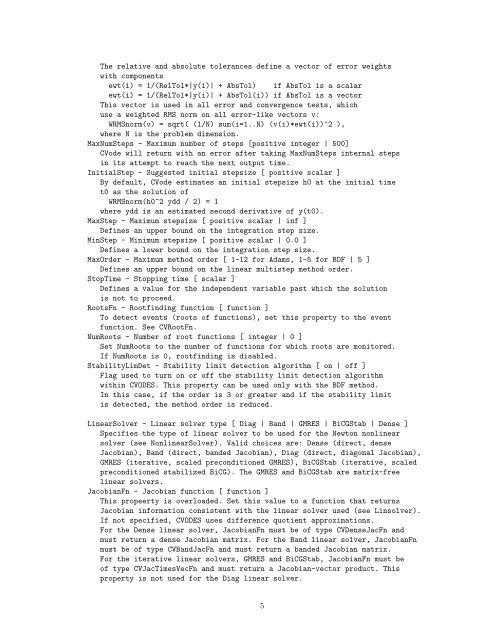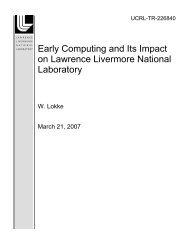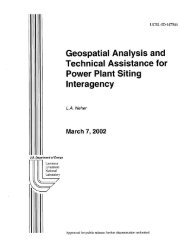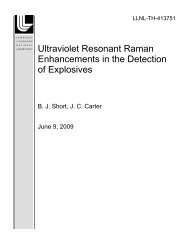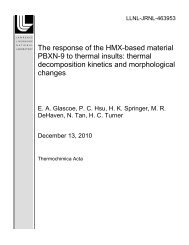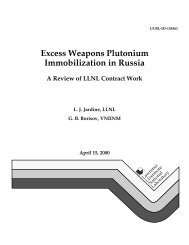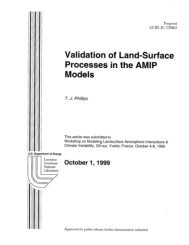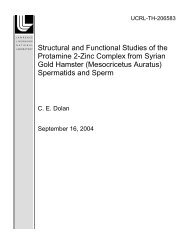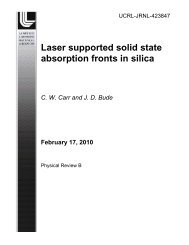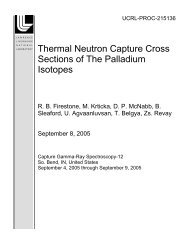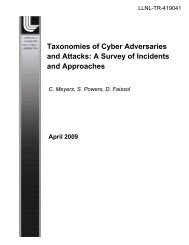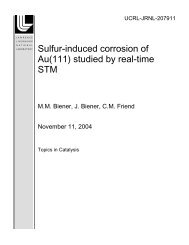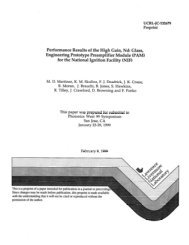sundialsTB, a Matlab Interface to SUNDIALS - Site Index Page ...
sundialsTB, a Matlab Interface to SUNDIALS - Site Index Page ...
sundialsTB, a Matlab Interface to SUNDIALS - Site Index Page ...
Create successful ePaper yourself
Turn your PDF publications into a flip-book with our unique Google optimized e-Paper software.
The relative and absolute <strong>to</strong>lerances define a vec<strong>to</strong>r of error weights<br />
with components<br />
ewt(i) = 1/(RelTol*|y(i)| + AbsTol) if AbsTol is a scalar<br />
ewt(i) = 1/(RelTol*|y(i)| + AbsTol(i)) if AbsTol is a vec<strong>to</strong>r<br />
This vec<strong>to</strong>r is used in all error and convergence tests, which<br />
use a weighted RMS norm on all error-like vec<strong>to</strong>rs v:<br />
WRMSnorm(v) = sqrt( (1/N) sum(i=1..N) (v(i)*ewt(i))^2 ),<br />
where N is the problem dimension.<br />
MaxNumSteps - Maximum number of steps [positive integer | 500]<br />
CVode will return with an error after taking MaxNumSteps internal steps<br />
in its attempt <strong>to</strong> reach the next output time.<br />
InitialStep - Suggested initial stepsize [ positive scalar ]<br />
By default, CVode estimates an initial stepsize h0 at the initial time<br />
t0 as the solution of<br />
WRMSnorm(h0^2 ydd / 2) = 1<br />
where ydd is an estimated second derivative of y(t0).<br />
MaxStep - Maximum stepsize [ positive scalar | inf ]<br />
Defines an upper bound on the integration step size.<br />
MinStep - Minimum stepsize [ positive scalar | 0.0 ]<br />
Defines a lower bound on the integration step size.<br />
MaxOrder - Maximum method order [ 1-12 for Adams, 1-5 for BDF | 5 ]<br />
Defines an upper bound on the linear multistep method order.<br />
S<strong>to</strong>pTime - S<strong>to</strong>pping time [ scalar ]<br />
Defines a value for the independent variable past which the solution<br />
is not <strong>to</strong> proceed.<br />
RootsFn - Rootfinding function [ function ]<br />
To detect events (roots of functions), set this property <strong>to</strong> the event<br />
function. See CVRootFn.<br />
NumRoots - Number of root functions [ integer | 0 ]<br />
Set NumRoots <strong>to</strong> the number of functions for which roots are moni<strong>to</strong>red.<br />
If NumRoots is 0, rootfinding is disabled.<br />
StabilityLimDet - Stability limit detection algorithm [ on | off ]<br />
Flag used <strong>to</strong> turn on or off the stability limit detection algorithm<br />
within CVODES. This property can be used only with the BDF method.<br />
In this case, if the order is 3 or greater and if the stability limit<br />
is detected, the method order is reduced.<br />
LinearSolver - Linear solver type [ Diag | Band | GMRES | BiCGStab | Dense ]<br />
Specifies the type of linear solver <strong>to</strong> be used for the New<strong>to</strong>n nonlinear<br />
solver (see NonlinearSolver). Valid choices are: Dense (direct, dense<br />
Jacobian), Band (direct, banded Jacobian), Diag (direct, diagonal Jacobian),<br />
GMRES (iterative, scaled preconditioned GMRES), BiCGStab (iterative, scaled<br />
preconditioned stabilized BiCG). The GMRES and BiCGStab are matrix-free<br />
linear solvers.<br />
JacobianFn - Jacobian function [ function ]<br />
This propeerty is overloaded. Set this value <strong>to</strong> a function that returns<br />
Jacobian information consistent with the linear solver used (see Linsolver).<br />
If not specified, CVODES uses difference quotient approximations.<br />
For the Dense linear solver, JacobianFn must be of type CVDenseJacFn and<br />
must return a dense Jacobian matrix. For the Band linear solver, JacobianFn<br />
must be of type CVBandJacFn and must return a banded Jacobian matrix.<br />
For the iterative linear solvers, GMRES and BiCGStab, JacobianFn must be<br />
of type CVJacTimesVecFn and must return a Jacobian-vec<strong>to</strong>r product. This<br />
property is not used for the Diag linear solver.<br />
5


